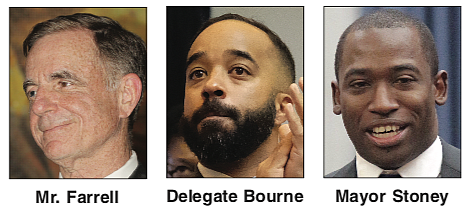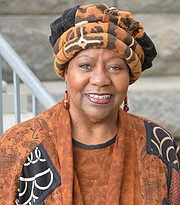Full-court press
Navy Hill District Corp. is pulling out all stops as Feb. 24 vote by City Council on $1.5B Coliseum replacement and Downtown development nears
Jeremy M. Lazarus | 1/24/2020, 6 a.m.
From robocalls to press conferences, the Navy Hill District Corp. that Dominion Energy top executive Thomas F. Farrell II heads is pulling out all the stops to generate public support for the $1.5 billion Richmond Coliseum replacement plan ahead of the scheduled vote by City Council in late February.
However, there is little sign that the campaign has created a groundswell of community backing or swayed any of the three to five City Council members who have signaled they are likely to vote “no” on the massive project.
The project needs the approval of at least seven of the nine City Council members.
Just as importantly, a last-ditch effort by Mr. Farrell and his team to adjust the project’s financing through state legislation to steer more state sales tax dollars to the project is seen as facing tough sledding in the General Assembly.
The bill was introduced by Richmond Delegate Jeff M. Bourne at the request of Navy Hill District Corp. and Mayor Levar M. Stoney.
The massive Navy Hill plan calls for replacing the closed Richmond Coliseum with a new, larger arena. The project also includes private development of about 2,000 new apartments, at least two office buildings, multiple retail stores and restaurants, a convention hotel, a food market and an entertainment center on about eight blocks north of Marshall Street near City Hall and two blocks south of Broad Street.
Despite the challenges, Navy Hill is continuing its robust lobbying campaign with only a month and one private consultant’s report left to go until the long-awaited City Council vote, now set for Monday, Feb. 24.
Ignoring a previously filed complaint that the Farrell-led nonprofit’s effort to sway public opinion and influence City Council violates federal regulations governing tax-exempt groups, the company has sought take its case to the community, according to reports the Free Press has received.
Residents, mainly in the African-American community, tell of receiving repeated telephone calls touting the benefits of the project and its potential for creating thousands of jobs, as well as big payouts for black-owned construction companies.
Some people are concerned about what they perceive as divisive messages that portray the issue of Navy Hill in terms of opponents seeking to deny a project that would benefit African-Americans.
“This has become increasingly racialized,” said one concerned individual, who asked for anonymity. “I don’t think that is good for our city.”
Meanwhile, a group of 20 area African-American ministers held a news conference Tuesday at Third Street Bethel A.M.E. Church in Jackson Ward with Mayor Stoney to endorse the project as a positive for the city and for the African-American community.
One of the leaders, Dr. Patricia Gould-Champ of Faith Community Baptist Church, said the group has had its questions answered and now believes it is time “to put trust and faith” that the city’s leaders and Navy Hill District Corp. know what they are doing.
She said the ministers believe that this would not just benefit the city but also benefit people through the jobs it would create for those who are struggling and have been left out of the city’s booming economy.
While the project could mean that those “who have will get more,” she said, the crucial aspect is that it is inclusive and ensures those who do not have also will reap rewards.
Among those who stood with Dr. Gould-Champ were the Rev. F. Todd Gray of Fifth Street Baptist Church, the Rev. A. Lincoln James Jr. of Trinity Baptist Church and the Rev. Dwayne E. Whitehead of New Canaan International Church.
The participants also included City Councilman Michael J. Jones, pastor of Village of Faith. He said later he came to “stand in solidarity with colleagues and their message of African-American inclusion,’ but it did not yet signal his decision to vote for the project.
“I am still waiting for one piece of information,” he said of the consultant’s report.
At the General Assembly, Mayor Stoney is among those lobbying for passage of the bill Delegate Bourne introduced Jan. 7 just before the filing deadline.
The Free Press confirmed that Mr. Farrell was involved in proposing the language for the bill that would authorize shifting a projected $85 million in state sales taxes over 30 years to help cover the construction and debt costs on the arena.
The Free Press has learned that the mayor and others promoting the Navy Hill project are meeting headwinds in the state Senate, where members of the Richmond delegation are not enthused about getting enmeshed in the controversial proposal.
According to legislators, the General Assembly generally does not approve such specialty legislation if the delegation is divided, particularly if the locality’s governing body has not issued a statement of support. That has not happened in this case.
And having Mr. Farrell’s name associated with the project is not helping. A number of Democratic legislators around the state ran on not accepting campaign funds from Dominion Energy.
According to campaign records, Delegate Bourne accepted $22,000 in campaign donations from Dominion Energy and $2,000 from Mr. Farrell for the November 2019 election.
Under the Bourne bill, a portion of the state sales tax generated from services and purchases of food and other items at a new Coliseum or any Navy Hill-related development could be used to pay for the Coliseum’s construction and debt.
Those state dollars would join about $140 million in local sales tax on meals and other items that is projected to be generated by the project and are earmarked for arena debt repayment.
According to Mayor Stoney and Davenport & Co., the city’s financial adviser, the use of state sales tax dollars would sharply reduce the amount of city real estate tax dollars that would be needed to repay the arena’s cost and shrink the proposed Tax Increment Financing District, or TIF District, which would generate Coliseum financing through the future growth in real estate taxes in the area.
The revamped plan would reduce the TIF District from 80 blocks to 11 blocks, according to the revised projections. Those would include the blocks of city-owned land Navy Hill proposes to develop north and south of Broad and at least the block occupied by the new tower Dominion Energy has built on Canal Street.








